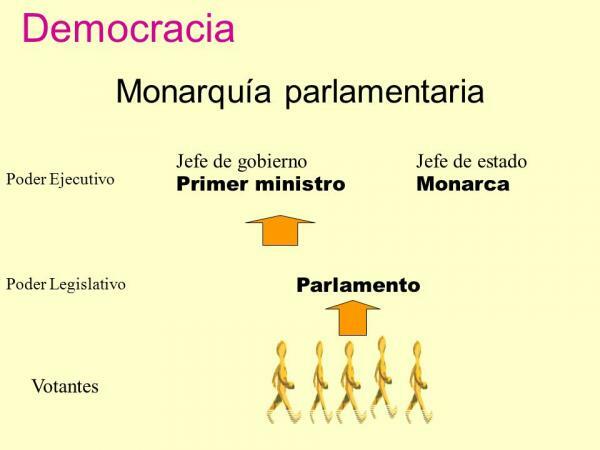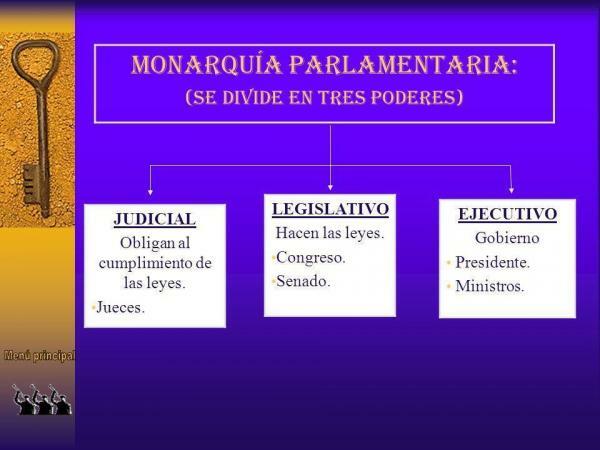Parliamentary monarchy: short definition

Image: Slideplayer
The term parliamentary monarchy it condenses two historical political elements in a continuous confrontation for power. It is therefore a term that refers to the consummation of an extensive historical process in the that kings have been losing power to the detriment of parliaments and other systems of representation. Next, in this lesson from unPROFESOR.com we are going to offer a short definition of the parliamentary monarchy to know what it is, its origins and its main characteristics.
Index
- Limitation of actual power
- Evolution of monarchical regimes
- Origins of the parliamentary monarchy
- Characteristics of the parliamentary monarchy
Limitation of real power.
The parliamentary monarchy is really the culmination of a process of limiting the power of the monarch, a historical evolution that begins in England, in the seventeenth century, with the transformation of the absolute monarchy into a constitutional monarchy, thanks to the
Glorious Revolution (1688), beginning a historical process that spanned more than a century and a half until reaching the parliamentary monarchy.This process is characterized by:
- The real power decreases and that of parliament as a political body is strengthened.
- In this, the Prime Minister and his cabinet become independent from the king, gradually realizing the prerogatives governments, but with greater dependence on the legislative body, to which they are accountable for their job.
- The prime minister becomes the goverment's head and the monarch becomes, in a more symbolic or formal position, the head of state.
Evolution of monarchical regimes.
The historical process of tension between king and parliament, which we have pointed out above, in Europe since the Middle Ages to Contemporary Ages, it was giving rise to an evolution of the monarchy in the following terms:
- Absolute monarchy: in which all powers are concentrated in the king. In this other lesson we will discover the absolute monarchies of the Modern Age.
- Limited monarchy: the monarch loses powers in favor of parliament, although he continues to maintain those that are not expressly attributed to the representative body.
- Constitutional monarchy: monarch and parliament share sovereignty, the latter having the general powers and the former those expressly attributed by the constitution.
- Parliamentary monarchy: characterized by the fact that the king no longer has political decision-making power.
Origins of the parliamentary monarchy.
The monarchy is a form of government that has existed since ancient times that is usually held by a single person and has a life and hereditary character. But it is true that from a certain moment the monarchs will have to face other sources of power that will try limit its power, appearing parliaments.
In Europe, it is in the Middle Ages when parliamentary institutions such as representative assemblies begin to share power with the monarch, assuming important functions, being the antecedent of the parliaments contemporaries. On Spain, for example, Leonese courts (1188) are the first assemblies in medieval Europe attended by citizens, including some elected.
In the Modern age, while on the continent there is an increase in royal power vis-à-vis parliaments, in England their revolution almost a century to the French, giving rise to a gradual process of parliamentary strengthening at the expense of the powers of the monarch.
Constitutionalism in 17th and 18th centuries and the enlightenment rationalism they will give rise to the appearance of constitutional limited monarchies and, later, parliamentary ones, trying to unite the traditional legitimation of the king with the rationalization of the political power.

Image: Slideplayer
Characteristics of the parliamentary monarchy.
In the following centuries, the parliamentary monarchy, with the following peculiarities:
- The head of state, life and hereditary, in a monarch, compatible with the greater democratic rationalization in the design of the model of separation of powers.
- The king therefore loses all political power, splitting the legitimacy of the other powers of the parliament, who is the one who assumes the legislative power and elects the executive.
- The parliamentary monarchy is erected as the only way in which the monarchy can survive in a state that is democratic, and as an alternative to republic.
Currently, there are a large number of parliamentary monarchies, each country choosing the form of government that best suits its history and its own political circumstances.
In Europe, parliamentary monarchy systems are maintained in some countries such as England, Belgium, the Netherlands, Luxembourg, Liechtenstein, Monaco, most of the Nordic countries and Spain.
If you want to read more articles similar to Parliamentary monarchy: short definition, we recommend that you enter our category of Story.



